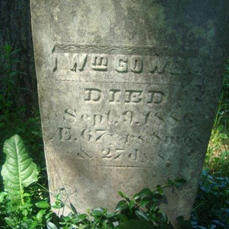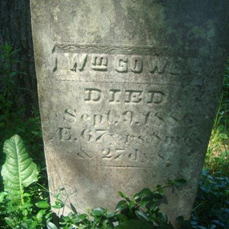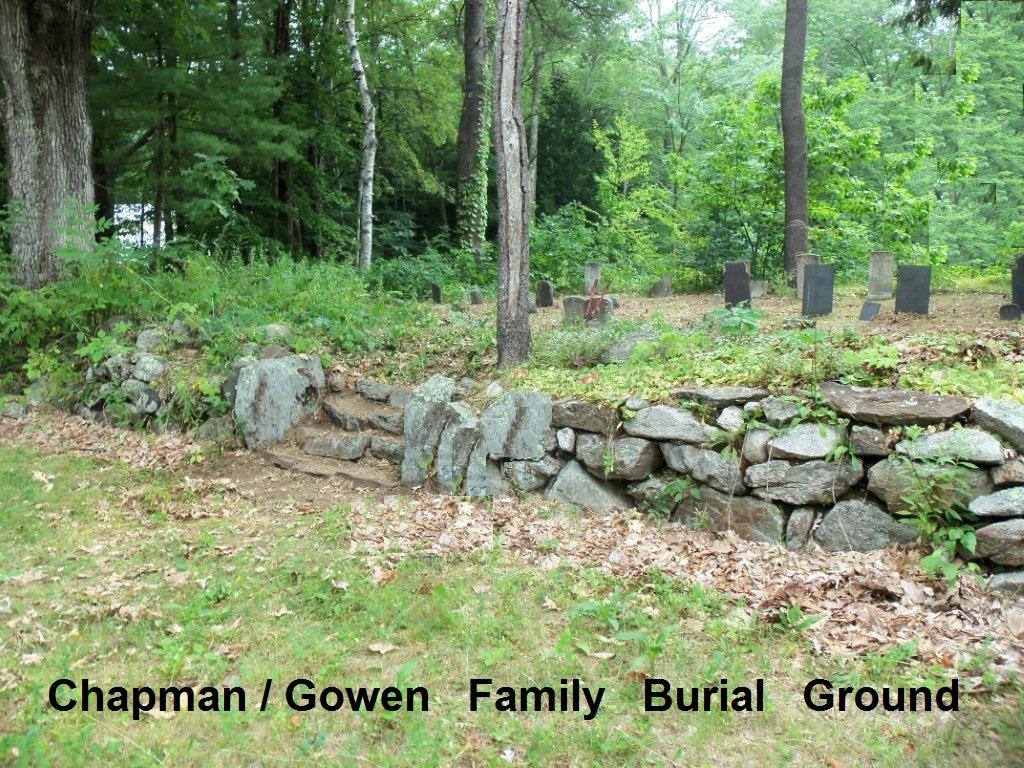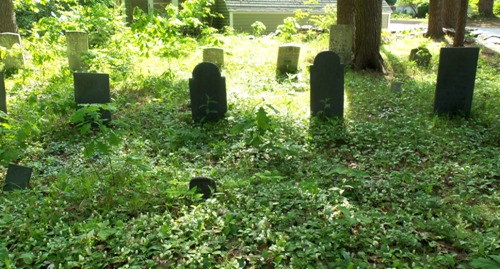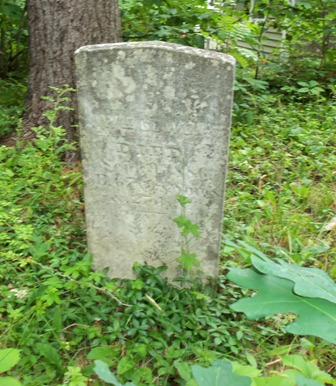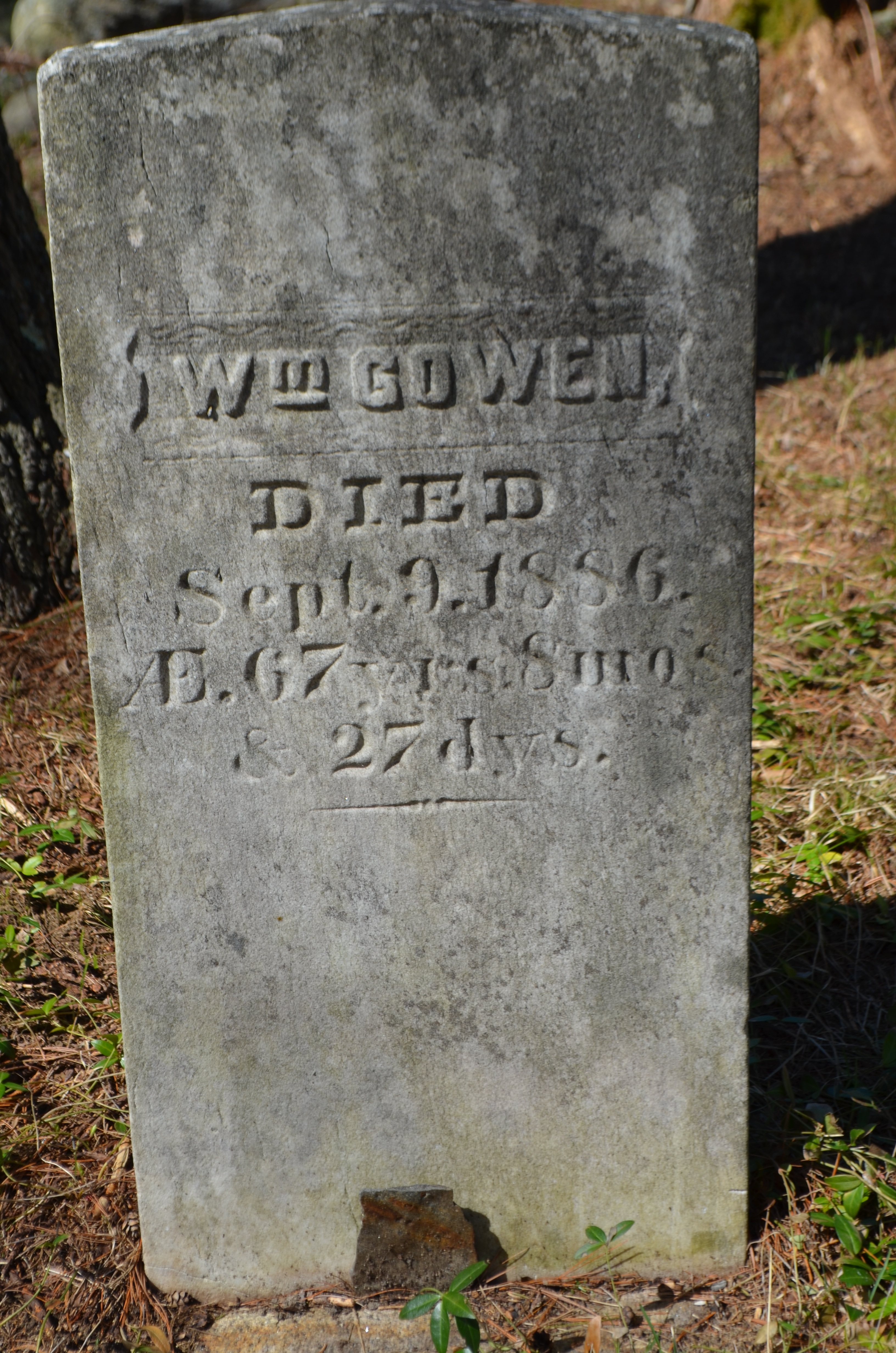William and Priscilla married on 12 May 1846
at Sanford, York, Maine.
They were the parents of four children;
Howard, Frances Augusta; Lewis Woodbury,
Frances Priscilla.
The family is recorded on the 1850 & 1860 census at Sanford, York, Maine.
William {Age 62; Widower} is recorded
on the 1880 census at Sanford, York, Maine.
He is blind and disabled.
*******************************
The Seasons
Biographical and Introductory Note
by Lewis Woodbury Gowen.
My father, William Gowen, author of the following poem {not attached here}, was born in Sanford, York County, Maine, December 12, 1818.
His father, whose name was also William, owned and lived on a farm situated on the south-west bank of the Mousam River and about midway between the villages of Sanford Corner and Springvale, Maine {note: now the site of Gowen Memorial Park}. But though living on a farm and devoting a portion of his time to its cultivation, he was a teacher by profession and also worked to some extent at surveying. He was commonly known as 'Master Gowen' and taught the Sanford Corner school for twenty one successive years. His death occurred in 1831 when his youngest son, William was a little over twelve years of age.
After his father's death, the subject of this sketch continued to live at the old homestead with an older brother, whose name was Isaiah, until twenty one years of age and although his schooling was limited, he managed to fit himself for teaching and until after his marriage he taught with good success in various localities in hi native state and one year in Pennsylvania.
Before he had reached his thirty-fifth year he had suffered much with rheumatism which eventually became chronic. As early as 1866 he was at times seriously crippled in his arms or shoulders and sometimes in the lower limbs and by 1871 he was unable to walk much without a crutch and cane. This was fifteen years before his death and according to the best recollection of the writer during the last ten years of his life he was not able to walk even with crutches.
Severe as this affliction was, both in pain and privation, still another had to be endured. He had inherited from his mother's family a predisposition to a disease of the eyes known as "retinitis pigmentosa". This disease began to manifest itself in impaired vision to some extent in early life but not until about the time he became too crippled for active labor did it reach a stage that seriously restricted his movements. He reached the fiftieth year of his age in 1868 and after this his eyesight failed so rapidly that by 1876 he was practically blind, so that nearly all the last ten years of his life was spent in a dimness which grew to nearly utter darkness some two or three years before he died.
The year 1871 has been spoken of as about the time he became unable to walk without a crutch and cane. His eyesight was also very poor by that time but not yet so dim as to prevent reading to some extent and writing, though he found it necessary to rule his paper with heavy lines in order to follow them.
It was about this time that he began to write poetry. For a few years he wrote only short poems and occasionally wrote an essay on some religious subject. He was devout in spirit and quite a deep reasoner on Biblical doctrines. He had been baptized by Rev. John Peacock at Springvale, Maine, where he retained his membership until his death.
The exact date when he began to write this poem entitled "The Seasons" is not now known nor the exact data when he did his last work upon it but according to the writer's best recollection he began it about 1874 and continued to rewrite or in various places improve it until near heis death which occurred in 1886. We may, therefore, safely say that his work on "Seasons" was all or nearly all done during the last twelve years of his life, during nearly all of which he was entirely unable to walk and during the last five or six years of which he found it necessary to use the kind assistance of various friends in writing down his thoughts.
It is but a just tribute to the generous sympathy of these friends that he received so much assistance and were their names known to this writer they should be here recorded.
The first copy of The Seasons was in his own handwriting and is now in possession of the writer of this note. The date give in July, 1874. This I suppose was when he began the work.
The manuscript from which the following pages are copied is wholly in the handwriting of others and in part is so finely written and with such poor ink as to be difficult to read though less than ten years have passed since the writing was done. The manuscript bears June 29, 1880, as date of beginning.
It was my father's wish and expectation to spend his last days with me and during the Summer of 1886 we were make arrangements for him to visit me at my home which was then at Alexandria, Nebraska, where I was pastor of the Baptist Church. It was expected by both of us that I should rewrite the entire poem and every improvement be made in it that might seem possible to either of us. But this was not to be for he was attacked with inflammation of the stomach and passed away September 9, 1886, aged nearly 67 years and 9 months.
I now prefer to preserve the poem with scarcely any alterations other than to correct such errors as seem to have occurred through some oversight or possible mistake on the part of his copyist. As he says he "did not write for critic's eye" but "to pass away the tedious hours". We have, therefore, in the following pages the poem almost exactly as he left it. Let those who read it remember the nearly blind cripple writing a few lines at a time and then resting the failing eyes or later on dictating to some kind hearted friend a page or two that represented the activity of his mind for hours that else had been spent in gloomy despondency.
The poem is a picture, or series of pictures of the surroundings and activities of the busy life of hard labor that was his before his lameness. He lived his life over again in this poem. The work was precious in his estimation for it was a source of great comfort to him.
Before these remarks are closed on more incident shall be mentioned. He experienced very strong conviction after his conversion that he ought to preach the Gospel but felt that the dimness of his sight unfitted him for the work and pleaded to be excused. He was, however, voted a license and for about nine months preached at Emery's Mills, Maine, and some at Alfred Gore, Maine. From some things he said to me it appeared that he felt his lameness and poor health, for he suffered much from dyspepsia an dallied complaints, were in part at least punishment for disobedience to the voice of God in regard to entering the ministry. He did the best to give me an education and prayed that I might be called to do the work he had neglected. When it was found that I too must suffer with the same disease of the eyes with which he had been afflicted, his feelings may be imagined but not described. It was given him to live until I had accomplished a little more than the first ten years of my ministry and to know that my labors were owned and blest of God.
At this writing he has slept beside his wife for more than six years, unvexed by worldly care and knowing naught of blindness, lameness or sickness. Slept,- yes, the worn and wearied body sleeps,- but a comforting hope is entertained that both father and mother are numbered among those who are robed in white and see the face of the Saviour.
This poem The Seasons and other shorter ones written by my father will, I hope, be preserved by my descendants and it may be that some of them in years to come take pleasure in their perusal. As the reader will recognize, and as indeed my father did, they contain many imperfections but they also contain much of beauty and merit. The Seasons did not leave my father's hands a finished work. As before noted he hoped to go over it with me and make many revisions and corrections. I do not feel equal to the task alone and the eyesight remaining to me I must husband carefully or pass my last days in darkness. I cherish the thought, however, that in a generation of the family yet to come there may be one with the genius to build from this framework a creation which will be beautiful and harmonious throughout and worthy of presentation to the world.
The years are swiftly passing, bringing to me dimness of sight as the former years did to my father, but I have great reason for thankfulness that the added trial of lameness has not been sent to me nor have I been called to suffer any serious impairment of health. For this and all other mercies I praise God and toil on and wait until I too shall "accomplish as a hireling my day".
Lewis W. Gowen.
Pullman, Washington,
January, 1893.
William and Priscilla married on 12 May 1846
at Sanford, York, Maine.
They were the parents of four children;
Howard, Frances Augusta; Lewis Woodbury,
Frances Priscilla.
The family is recorded on the 1850 & 1860 census at Sanford, York, Maine.
William {Age 62; Widower} is recorded
on the 1880 census at Sanford, York, Maine.
He is blind and disabled.
*******************************
The Seasons
Biographical and Introductory Note
by Lewis Woodbury Gowen.
My father, William Gowen, author of the following poem {not attached here}, was born in Sanford, York County, Maine, December 12, 1818.
His father, whose name was also William, owned and lived on a farm situated on the south-west bank of the Mousam River and about midway between the villages of Sanford Corner and Springvale, Maine {note: now the site of Gowen Memorial Park}. But though living on a farm and devoting a portion of his time to its cultivation, he was a teacher by profession and also worked to some extent at surveying. He was commonly known as 'Master Gowen' and taught the Sanford Corner school for twenty one successive years. His death occurred in 1831 when his youngest son, William was a little over twelve years of age.
After his father's death, the subject of this sketch continued to live at the old homestead with an older brother, whose name was Isaiah, until twenty one years of age and although his schooling was limited, he managed to fit himself for teaching and until after his marriage he taught with good success in various localities in hi native state and one year in Pennsylvania.
Before he had reached his thirty-fifth year he had suffered much with rheumatism which eventually became chronic. As early as 1866 he was at times seriously crippled in his arms or shoulders and sometimes in the lower limbs and by 1871 he was unable to walk much without a crutch and cane. This was fifteen years before his death and according to the best recollection of the writer during the last ten years of his life he was not able to walk even with crutches.
Severe as this affliction was, both in pain and privation, still another had to be endured. He had inherited from his mother's family a predisposition to a disease of the eyes known as "retinitis pigmentosa". This disease began to manifest itself in impaired vision to some extent in early life but not until about the time he became too crippled for active labor did it reach a stage that seriously restricted his movements. He reached the fiftieth year of his age in 1868 and after this his eyesight failed so rapidly that by 1876 he was practically blind, so that nearly all the last ten years of his life was spent in a dimness which grew to nearly utter darkness some two or three years before he died.
The year 1871 has been spoken of as about the time he became unable to walk without a crutch and cane. His eyesight was also very poor by that time but not yet so dim as to prevent reading to some extent and writing, though he found it necessary to rule his paper with heavy lines in order to follow them.
It was about this time that he began to write poetry. For a few years he wrote only short poems and occasionally wrote an essay on some religious subject. He was devout in spirit and quite a deep reasoner on Biblical doctrines. He had been baptized by Rev. John Peacock at Springvale, Maine, where he retained his membership until his death.
The exact date when he began to write this poem entitled "The Seasons" is not now known nor the exact data when he did his last work upon it but according to the writer's best recollection he began it about 1874 and continued to rewrite or in various places improve it until near heis death which occurred in 1886. We may, therefore, safely say that his work on "Seasons" was all or nearly all done during the last twelve years of his life, during nearly all of which he was entirely unable to walk and during the last five or six years of which he found it necessary to use the kind assistance of various friends in writing down his thoughts.
It is but a just tribute to the generous sympathy of these friends that he received so much assistance and were their names known to this writer they should be here recorded.
The first copy of The Seasons was in his own handwriting and is now in possession of the writer of this note. The date give in July, 1874. This I suppose was when he began the work.
The manuscript from which the following pages are copied is wholly in the handwriting of others and in part is so finely written and with such poor ink as to be difficult to read though less than ten years have passed since the writing was done. The manuscript bears June 29, 1880, as date of beginning.
It was my father's wish and expectation to spend his last days with me and during the Summer of 1886 we were make arrangements for him to visit me at my home which was then at Alexandria, Nebraska, where I was pastor of the Baptist Church. It was expected by both of us that I should rewrite the entire poem and every improvement be made in it that might seem possible to either of us. But this was not to be for he was attacked with inflammation of the stomach and passed away September 9, 1886, aged nearly 67 years and 9 months.
I now prefer to preserve the poem with scarcely any alterations other than to correct such errors as seem to have occurred through some oversight or possible mistake on the part of his copyist. As he says he "did not write for critic's eye" but "to pass away the tedious hours". We have, therefore, in the following pages the poem almost exactly as he left it. Let those who read it remember the nearly blind cripple writing a few lines at a time and then resting the failing eyes or later on dictating to some kind hearted friend a page or two that represented the activity of his mind for hours that else had been spent in gloomy despondency.
The poem is a picture, or series of pictures of the surroundings and activities of the busy life of hard labor that was his before his lameness. He lived his life over again in this poem. The work was precious in his estimation for it was a source of great comfort to him.
Before these remarks are closed on more incident shall be mentioned. He experienced very strong conviction after his conversion that he ought to preach the Gospel but felt that the dimness of his sight unfitted him for the work and pleaded to be excused. He was, however, voted a license and for about nine months preached at Emery's Mills, Maine, and some at Alfred Gore, Maine. From some things he said to me it appeared that he felt his lameness and poor health, for he suffered much from dyspepsia an dallied complaints, were in part at least punishment for disobedience to the voice of God in regard to entering the ministry. He did the best to give me an education and prayed that I might be called to do the work he had neglected. When it was found that I too must suffer with the same disease of the eyes with which he had been afflicted, his feelings may be imagined but not described. It was given him to live until I had accomplished a little more than the first ten years of my ministry and to know that my labors were owned and blest of God.
At this writing he has slept beside his wife for more than six years, unvexed by worldly care and knowing naught of blindness, lameness or sickness. Slept,- yes, the worn and wearied body sleeps,- but a comforting hope is entertained that both father and mother are numbered among those who are robed in white and see the face of the Saviour.
This poem The Seasons and other shorter ones written by my father will, I hope, be preserved by my descendants and it may be that some of them in years to come take pleasure in their perusal. As the reader will recognize, and as indeed my father did, they contain many imperfections but they also contain much of beauty and merit. The Seasons did not leave my father's hands a finished work. As before noted he hoped to go over it with me and make many revisions and corrections. I do not feel equal to the task alone and the eyesight remaining to me I must husband carefully or pass my last days in darkness. I cherish the thought, however, that in a generation of the family yet to come there may be one with the genius to build from this framework a creation which will be beautiful and harmonious throughout and worthy of presentation to the world.
The years are swiftly passing, bringing to me dimness of sight as the former years did to my father, but I have great reason for thankfulness that the added trial of lameness has not been sent to me nor have I been called to suffer any serious impairment of health. For this and all other mercies I praise God and toil on and wait until I too shall "accomplish as a hireling my day".
Lewis W. Gowen.
Pullman, Washington,
January, 1893.
Inscription
WILLIAM GOWEN
died September 9, 1886
age 67 years & 8 months & 27 days
Family Members
Advertisement
Advertisement
